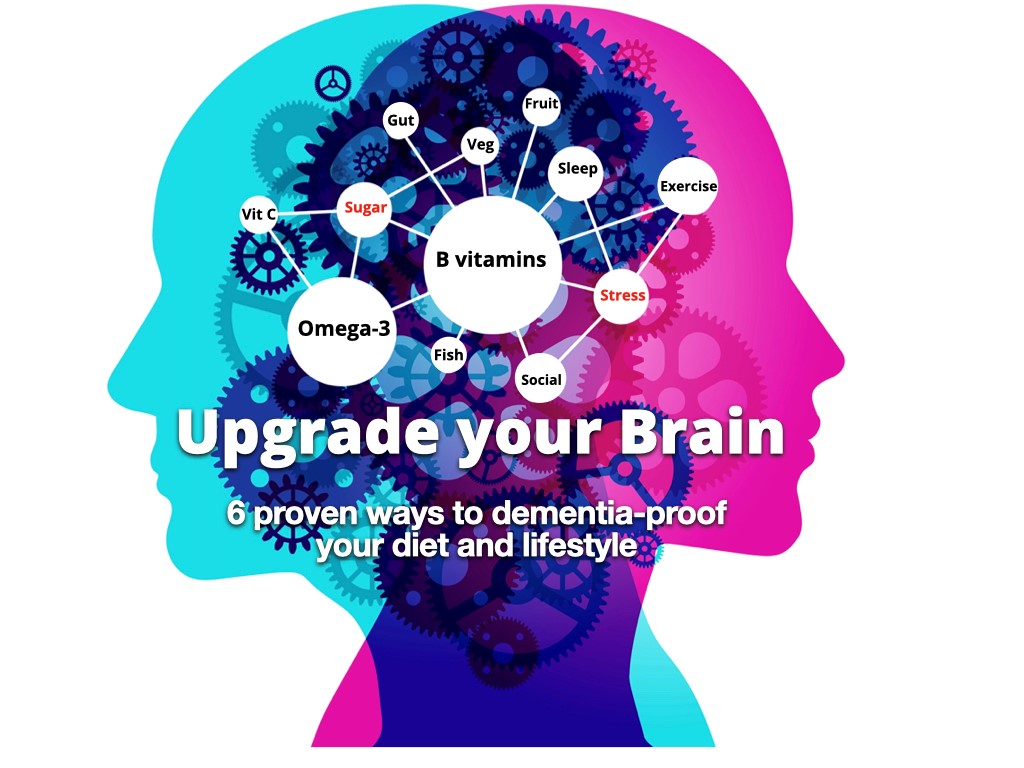Taking on dementia risks through diet and lifestyle

Contrary to the beliefs of many, Alzheimer’s is not an inevitable consequence of ageing – and Alzheimer’s is not in the genes. Fewer than one in every hundred Alzheimer’s diagnoses are attributed to genes.[1] It is largely a preventable disease, and we know quite a lot about what people need to do to help prevent it.
Patrick Holford, founder of the Food for the Brain Foundation, explains that by making a few relatively simple diet and lifestyle changes in mid-life, most people can slash their risk of Alzheimer’s (which accounts for up two thirds of dementia).
Increase fish (or vegan omega-3 supplement) consumption
DHA (Docosahexaenoic acid) is an important omega-3 fatty acid, and it is found in seafood and certain types of algae.
A study of almost half a million people from the UK’s Bio Bank found that those taking fish oil supplements had a 7% lower risk of dementia[2]. The same was true for those with higher blood levels. Eating three servings of fish a week cuts Alzheimer’s risk by a third.[3] The best fish are those that swim in cold water and eat other fish. Salmon, mackerel, sardines, anchovies, herring and kippers are all excellent. If your pocket (and perhaps your gag reflex) allows, best of all is caviar.
Algal or seaweed-derived DHA is just as good as that found in fish, so this is essential for vegans and vegetarians. You need at least 200mg a day, but ideally double this amount. A very small amount of ALA (alpha-linolenic acid) in walnuts, chia and flax seeds, as well as colder climate leafy vegetables, does convert through to DHA so these foods are also important to eat on a daily basis.
Choose antioxidant rich fruit and veg
Brain-friendly antioxidants and polyphenols (which improve circulation in your brain and help keep it young) are found in fruits, vegetables, herbs, and spices. Having a handful of berries a day (blueberries being the best), and at least four servings of vegetables is a good stating place. Cacao in chocolate is also brain-friendly[4], but the sugar isn’t. Try having a cocoa drink, made with cacao powder (without sugar). To flavour your meals, spices such as turmeric, cumin and chilli, cayenne or paprika are all great sources of polyphenols.
Reduce sugar and carbs
We know sugar is not our friend. But not only because of waistlines and tooth decay. A 2022 US study reported that a blood sugar level in the high end of the normal range when aged 35 increased a person’s risk of developing Alzheimer’s later in life by 15%.[5] So cutting back on sugar goes a long way to reducing your dementia risk.
Remember that we’re not just talking about cakes and sweets. Sugary junk food, sweetened drinks and white, refined bread, rice and pasta are also on the list of foods to limit in our diets. We should be having more beans, fish, and chicken. For breakfast, have eggs, yoghurt, nuts, seeds and berries, with oats replacing sugary cereals and oat cakes instead of bread.
Boost B vitamins intake
The first study that showed a reversal in the rate of brain shrinkage in people with pre-dementia showed that B vitamins (supplements of vitamin B6, B12 and folic acid were given) halved the rate of brain shrinkage and cut the shrinkage in the Alzheimer’s areas of the brain by nine times.[6] The best drug to date has cut brain shrinkage by 2%.
B vitamins are important because they help attach omega-3 into your brain. Professor David Smith’s group at Oxford University has shown that omega-3 fats don’t work nearly so well without B vitamins, and that B vitamins don’t work in people with low intake of omega-3. You need both.
“In those with sufficient omega-3 status, B vitamins resulted in up to 73% less brain shrinkage and slowed memory decline,”[7] says Professor Smith. One in three ended the trial with no clinical signs of dementia at all. Two other trials, in the Netherlands[8] and Sweden[9], have confirmed that omega-3 and B vitamins are a dynamic duo, slowing down cognitive decline when both are sufficient.
The three critical B vitamins, vitamin B6, B12 and folic acid or folate are found in green foods (think foliage). We recommend that older people supplement at least 10mcg of vitamin B12 a day, but the study gave 500mcg. This is because many older people absorb B12 less well. It needs stomach acid, so those on antacid drugs often end up lacking B12.[10]
Be active and healthy
As well as being physically active, it’s important that you exercise your brain. And workouts for your brain and body are linked. Tommy Wood, Assistant Professor at the University of Washington has shown that your muscle mass predicts brain volume. He says: “Exercise, especially resistance exercise, is important because it makes the brain do things that keep it healthy, such as growth and repair. When they aren’t stimulated, the health of brain tissues deteriorates, with a knock-on effect on memory and thinking.”
The Knowledge (which involves memorising 26,000 streets) is an exceptional mental feat undertaken by trainee London taxi drivers, A study found that those who passed, compared to those that failed. had literally built more brain tissue and connections.[11]
We also benefit from purely mental exercise – activities such as solving puzzles or learning a musical instrument or a new language. It’s especially good to attempt to master something you are bad at.
Smoking is also a big risk factor. US National Institutes of Health research attributes 22% of risk to smoking. Other major risks are lack of omega-3 (22%), raised blood homocysteine level, a measure of B vitamin status.[12] (22%), and inactive lifestyle (32%).
Avoid stress and sleep well
Muscles need time to rest after exercise, and so does your brain after a period of intense cognitive activity. Obviously, quality of sleep is important (the less disrupted your sleep is the better), but so too is the quantity. How much (or little) you sleep makes a big difference.
There is a sweet spot, and going too far below or too far beyond that can be detrimental to your efforts to keep dementia at bay. Sleeping nine or more hours, or just five hours is to be avoided – this doubles dementia risk.[13] The optimal amount of sleep per night is 7 hours, and the best time to head to bed is 10pm.
Online help
The Food for the Brain charity focuses on helping people make simple, positive changes. An NHS and University College of London study reported that 9 in 10 found the Food for the Brain free online Cognitive Function Test useful.[14] With the new COGNITION app—which is a personalised, interactive brain upgrade programme that helps you make simple changes to help reduce risk—you get support along the way, guiding you step by step.
A free on-line Cognitive Function Test, available at foodforthebrain.org not only shows how your brain is working, but there’s also a simple questionnaire about your diet and lifestyle that identifies the key changes that will make the most difference to dementia-proofing your future.
About the author
 Patrick Holford is a nutrition and mental health expert and founder of the Institute for Optimum Nutrition, VitaminC4Covid, and the charitable Food for the Brain Foundation, where he directs their Alzheimer’s prevention project. Patrick reads hundreds of studies a year assimilating the latest health breakthroughs and turning them into practical advice to make it easy for everyone to live a healthy life. He is author of 46 health books translated into over 30 languages.
Patrick Holford is a nutrition and mental health expert and founder of the Institute for Optimum Nutrition, VitaminC4Covid, and the charitable Food for the Brain Foundation, where he directs their Alzheimer’s prevention project. Patrick reads hundreds of studies a year assimilating the latest health breakthroughs and turning them into practical advice to make it easy for everyone to live a healthy life. He is author of 46 health books translated into over 30 languages.
References
[1] Bekris LM, Yu CE, Bird TD, Tsuang DW. Genetics of Alzheimer disease. J Geriatr Psychiatry Neurol. 2010 Dec;23(4):213-27. doi: 10.1177/0891988710383571. PMID: 21045163; PMCID: PMC3044597.
[2] Yu JT et al, Circulating polyunsaturated fatty acids, fish oil supplementation, and risk of incident dementia: a prospective cohort study of 440,750 participants, BMC medicine (pending publication)
[3] Kosti RI, Kasdagli MI, Kyrozis A, Orsini N, Lagiou P, Taiganidou F, Naska A. Fish intake, n-3 fatty acid body status, and risk of cognitive decline: a systematic review and a dose-response meta-analysis of observational and experimental studies. Nutr Rev. 2022 May 9;80(6):1445-1458. doi: 10.1093/nutrit/nuab078. PMID: 34605891.
[4] Smith AD, Smith SM, de Jager CA, Whitbread P, Johnston C, Agacinski G, Oulhaj A, Bradley KM, Jacoby R, Refsum H. Homocysteine-lowering by B vitamins slows the rate of accelerated brain atrophy in mild cognitive impairment: a randomised controlled trial. PLoS One. 2010 Sep 8;5(9):e12244. doi: 10.1371/journal.pone.0012244. PMID: 20838622; PMCID: PMC2935890.
[5] Zhang X, Tong T, Chang A, Ang TFA, Tao Q, Auerbach S, Devine S, Qiu WQ, Mez J, Massaro J, Lunetta KL, Au R, Farrer LA. Midlife lipid and glucose levels are associated with Alzheimer’s disease. Alzheimers Dement. 2022 . doi: 10.1002/alz.12641. Epub ahead of print. PMID: 35319157.
[6] Smith AD, Smith SM, de Jager CA, Whitbread P, Johnston C, Agacinski G, Oulhaj A, Bradley KM, Jacoby R, Refsum H. Homocysteine-lowering by B vitamins slows the rate of accelerated brain atrophy in mild cognitive impairment: a randomised controlled trial. PLoS One. 2010 Sep 8;5(9):e12244. doi: 10.1371/journal.pone.0012244. PMID: 20838622; PMCID: PMC2935890.
[7] Jernerén F, Elshorbagy AK, Oulhaj A, Smith SM, Refsum H, Smith AD (2015). Brain atrophy in cognitively impaired elderly: the importance of long-chain ω-3 fatty acids and B vitamin status in a randomised controlled trial. Am J Clin Nutr. 2015 Jul;102(1):215-21
[8] van Soest, A.P.M., van de Rest, O., Witkamp, R.F. et al. DHA status influences effects of B-vitamin supplementation on cognitive ageing: a post-hoc analysis of the B-proof trial. Eur J Nutr (2022). https://doi.org/10.1007/s00394-022-02924-w
[9] Jernerén F, Cederholm T, Refsum H, Smith AD, Turner C, Palmblad J, Eriksdotter M, Hjorth E, Faxen-Irving G, Wahlund LO, Schultzberg M, Basun H, Freund-Levi Y. Homocysteine Status Modifies the Treatment Effect of Omega-3 Fatty Acids on Cognition in a Randomised Clinical Trial in Mild to Moderate Alzheimer’s Disease: The OmegAD Study. J Alzheimers Dis. 2019;69(1):189-197. doi: 10.3233/JAD-181148. PMID: 30958356.
[10] Lamport DJ, Pal D, Moutsiana C, Field DT, Williams CM, Spencer JP, Butler LT. The effect of flavanol-rich cocoa on cerebral perfusion in healthy older adults during conscious resting state: a placebo controlled, crossover, acute trial. Psychopharmacology (Berl). 2015 Sep;232(17):3227-34. doi: 10.1007/s00213-015-3972-4. Epub 2015 Jun 7. PMID: 26047963; PMCID: PMC4534492.
[11] Woollett K, Maguire EA. Acquiring “the Knowledge” of London’s layout drives structural brain changes. Curr Biol. 2011 Dec 20;21(24):2109-14. doi: 10.1016/j.cub.2011.11.018. Epub 2011 Dec 8. PMID: 22169537; PMCID: PMC3268356.
[12]Beydoun MA, Beydoun HA, Gamaldo AA, Teel A, Zonderman AB, Wang Y. Epidemiologic studies of modifiable factors associated with cognition and dementia: systematic review and meta-analysis. BMC Public Health. 2014 Jun 24;14:643. doi: 10.1186/1471-2458-14-643. PMID: 24962204; PMCID: PMC4099157.
[13] Bubu OM, Brannick M, Mortimer J, Umasabor-Bubu O, Sebastião YV, Wen Y, Schwartz S, Borenstein AR, Wu Y, Morgan D, Anderson WM. Sleep, Cognitive impairment, and Alzheimer’s disease: A Systematic Review and Meta-Analysis. Sleep. 2017 Jan 1;40(1). doi: 10.1093/sleep/zsw032. PMID: 28364458; see also Sabia S, Fayosse A, Dumurgier J, van Hees VT, Paquet C, Sommerlad A, Kivimäki M, Dugravot A, Singh-Manoux A. Association of sleep duration in middle and old age with incidence of dementia. Nat Commun. 2021 Apr 20;12(1):2289. doi: 10.1038/s41467-021-22354-2. PMID: 33879784; PMCID: PMC8058039.
[14] M. Bird, C. Cooper, F. Patel, C. Copeman, J.L. Stansfeld, G. Charlesworth, E. Aguirre, The psychological determinants of making lifestyle and dietary behaviours after using an online cognitive health tool and its associated recommendations for protective cognitive health behaviours,The European Journal of Psychiatry,Volume 35, Issue 3,2021, Page 145

